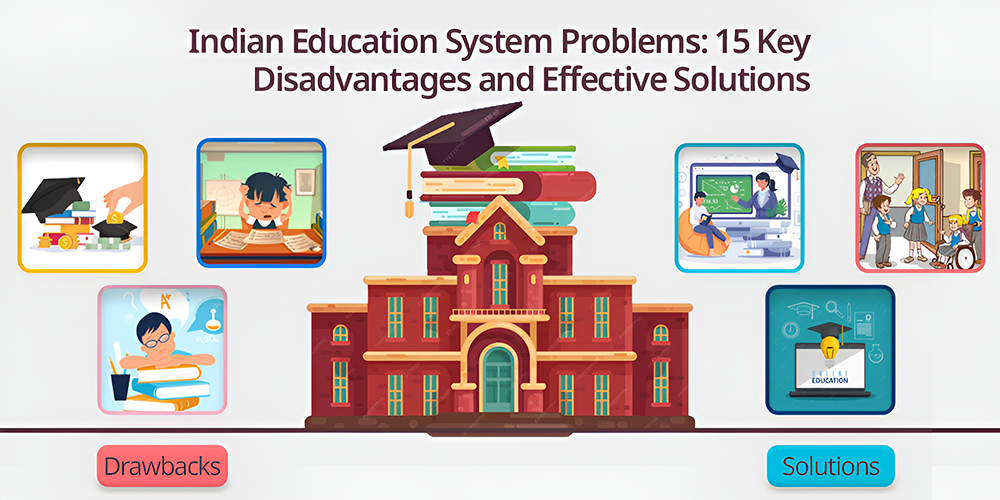
Do you ever wonder why the education system of India is struggling and has many issues with it even though it produces the most intelligent brains in the world?
The country has made massive advancements in terms of access to education, but there are many more internal issues.
In this blog, we will try to explain the current Indian education system and reveal 15 problems that are prevalent in it along with their potential solutions to show which way education might be taken in the future.
Explore in detail about Indian curriculum.
Table of Contents
- About the Indian Education System
- Top 15 Disadvantages or Problems in the Indian Education System
- 1. Lack of a Budget and Expensive Higher Education
- 2. Too Much Pressure on Grades
- 3. Too Much Competition
- 4. Not Focusing on Overall Growth
- 5. Lack of Training
- 6. Outdated Curriculum
- 7. Student-Teacher Ratio
- 8. Educational Inequality
- 9. Lack of Infrastructure
- 10. Neglect of Regional Languages
- 11. Theory-Based Education
- 12. Technology Integration
- 13. Problem of Brain Drain
- 14. Gross Enrolment Pattern
- 15. Accreditation and Branding
- Summing Words
About the Indian Education System
India has one of the largest and most diverse education systems to cater to over a million learners in thousands of schools and universities.
Being controlled by two authorities i.e. central education boards and state education boards, it consists of a structured framework of primary, secondary, and higher education.
They include public schools, private institutions, international schools as well as different regional boards, each having its own set down curricula and quality.
Even if there are perceived improvements in school enrolment especially for the less privileged children owing to the implementation of the RTE Act. The following areas still remain contentious; equitable access to inadequate facilities, quality education and poor teaching pedagogy among others.
The learning culture in the Indian education system is highly exam-oriented, academic success-driven as well as rote memorizing.
On the one hand, where there are highly successful elements within the system. These are such as Indian Institutes of Technology (IITs), and Indian Institutes of Management (IIMs). But there is still an even larger gap in overall quality, and dropout rates after primary education. Further, the ability to respond to the increasing skill intensity of the international labour markets demand is less for learners.
In the present era, many government schemes offer basic schooling but there are a few large problems that hamper the growth of the system completely.
Read on to learn more about advantages of Indian education system.
Top 15 Disadvantages or Problems in the Indian Education System
1. Lack of a Budget and Expensive Higher Education
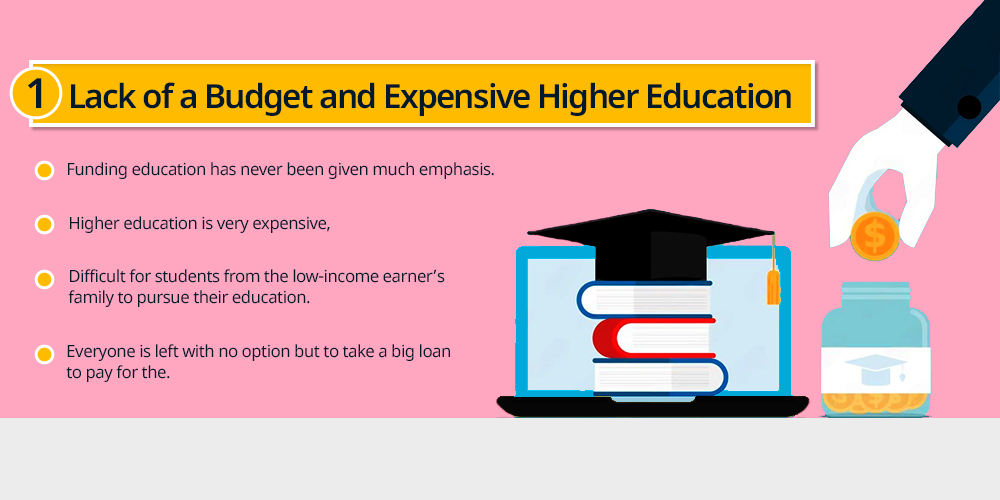
Out of all the sectors, in terms of funding education has never been given much emphasis in India which is why the majority of the government schools lack basic infrastructure and amenities.
On the other hand, higher education is expensive, most often denying the students from the low-income earner’s family a chance to pursue their education.
As a consequence, everyone is left with no option but to take a big loan to pay for the fees, or abandon the dream of getting an education.
Read Helping Affordable Online Schools Provide Quality Education to understand how online education provides affordability.
Solution: The Indian government can increase the public spending on education and scale up existing schemes like
- Sarva Shiksha Abhiyan: Sarva Shiksha Abhiyan is a government initiative aimed at providing compulsory access to education for children aged 6-14 years.
- Mid-Day Meal Scheme: This program provides free meals to students in government schools, improving attendance and nutrition.
- Beti Bachao Beti Padhao: This scheme focused on promoting education for girls and reducing gender disparities in school enrolment. It was implemented by the incumbent Prime Minister Of India, Narendra Modi, on 22nd January 2015
- Education for Girls: Various programs aim to encourage girls to pursue education, including scholarships and special initiatives like Kasturba Gandhi Balika Vidyalaya– implemented in the year 2006-07.
- Free and Compulsory Education: The Right to Education Act 2009 was enacted under Article 21 (a) of the Constitution of India ensures that every child aged 6-14 receives free and compulsory education in India.
- National Scholarships: Scholarships for meritorious and underprivileged students help bridge the gap between talent and opportunity.
- SWAYAM: SWAYAM is a government of India’s online education platform offering various courses, certifications, and degree programs from top institutions.
- DIKSHA: DIKSHA is a platform for teachers offering training modules and teaching resources to enhance the quality of teaching in schools.
2. Too Much Pressure on Grades
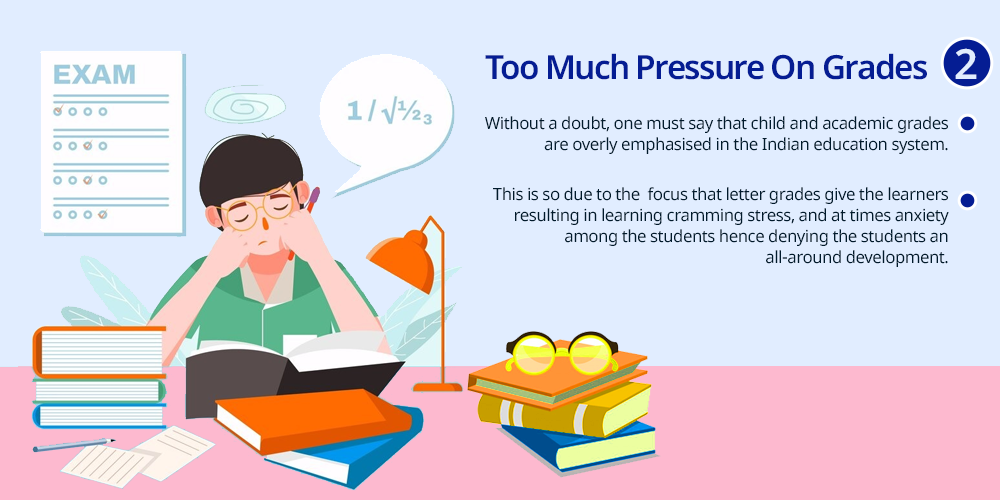
Without a doubt, one must say that child and academic grades are overly emphasised in the Indian education system.
This is so due to the focus that letter grades give the learners resulting in learning cramming stress, and at times anxiety among the students hence denying the students an all-around development.
To understand how student can manage the stress, read How can students cope with study stress?
Solution: The revamping of the assessment methods based on the National Education Policy (NEP) 2020 can move the rote-based evaluation into competency-based assessments.
3. Too Much Competition
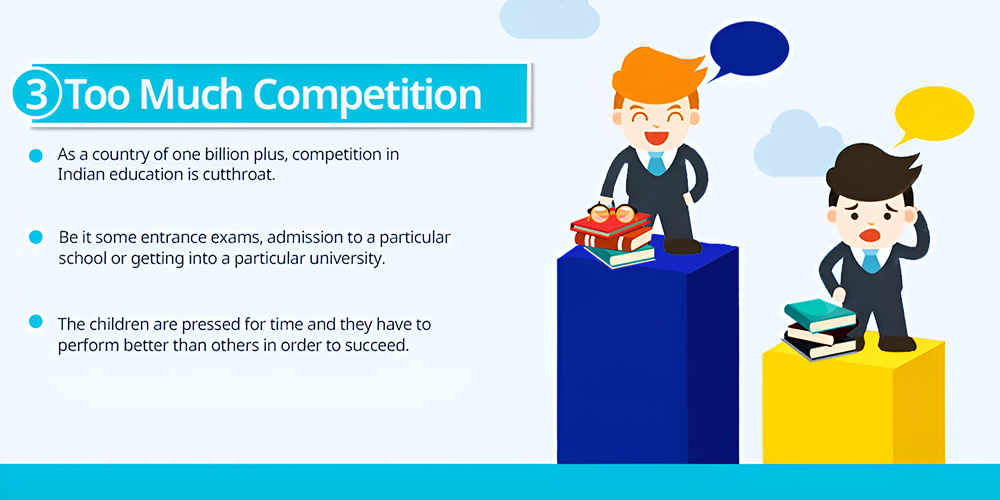
As a country of one billion plus, competition in Indian education is cutthroat.
Be it some entrance exams, admission to a particular school or even getting into a particular university – the children are pressed for time and they have to perform better than others in order to succeed.
It ultimately proves to be detrimental not only to the health of the child but is also a wrong approach towards the entire learning process.
Solution: The rising competition can be resolved by broadening the educational opportunities and reducing the dependency on the single exams. The shift from ranks to skills further supports the mental health and well-being of the students.
4. Not Focusing on Overall Growth
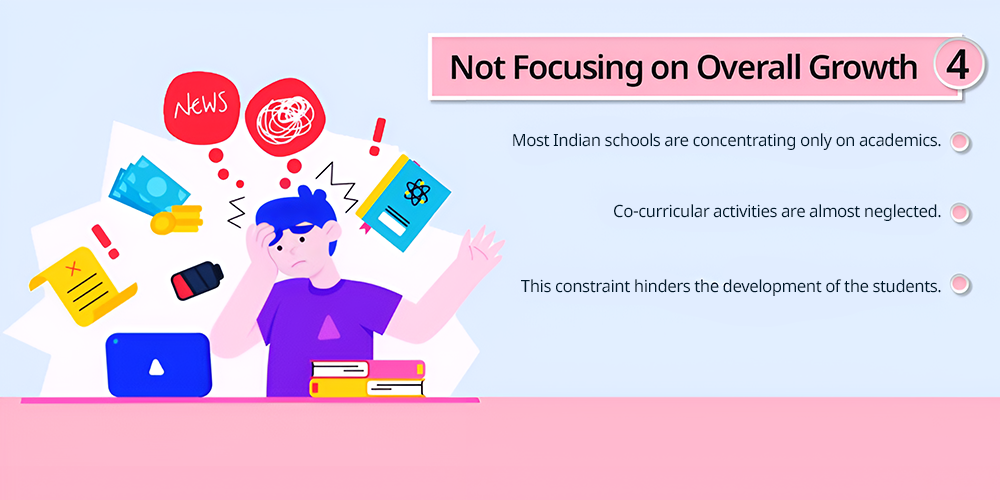
It was revealed that most Indian schools are concentrating only on academics and other aspects like co-curriculum activities like games and art as well as other character-building activities are almost neglected.
This constraint hinders the development of the students and limits their general kinetic capacity to challenge life skills such as innovative thinking, effective reasoning, or teaching leadership in early grades.
Solution: New strategies in classroom teaching as well as new strategies have to be used in a way that would counterbalance the boredom that may be associated with learners attending class.
This could include project-based education, several education, and several study education.
Read 7 Activities to Encourage Curiosity in Children to understand what activities can make learning fun and interesting.
5. Lack of Training
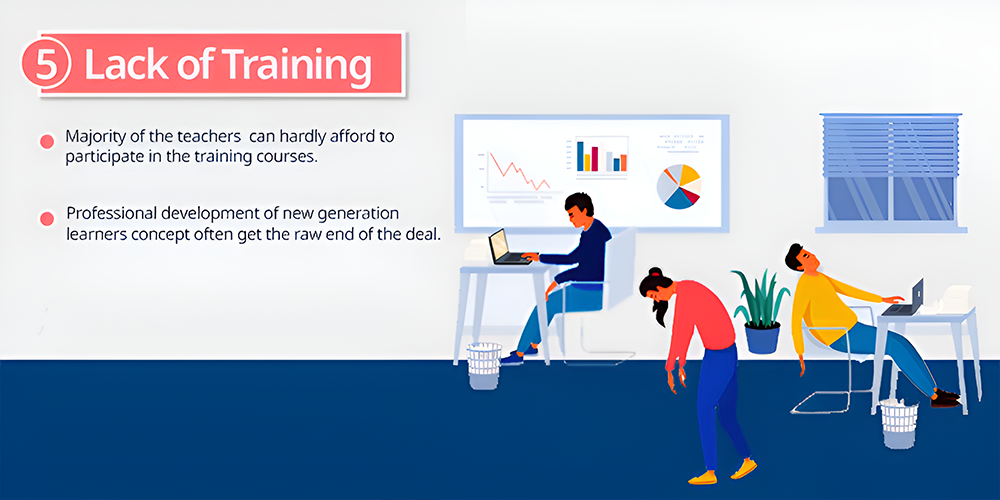
Alas, the majority of the teachers in India can hardly afford to participate in the requisite training courses.
As for professional development and the improved practices necessary for the successful new generation learners concept, this either gets the raw end of the deal.
Solution: Teachers should be informed of current practices in child education and teaching methods should be changed based on current learning ability.
Implicit within this then is the necessity of good professional development for teachers, as well as the skills training of practice and relation activities inside the classroom, as well as learning objectives having to be effective within practice change.
For teachers, read Develop a Child’s Problem Solving and Analytical Skills
6. Outdated Curriculum
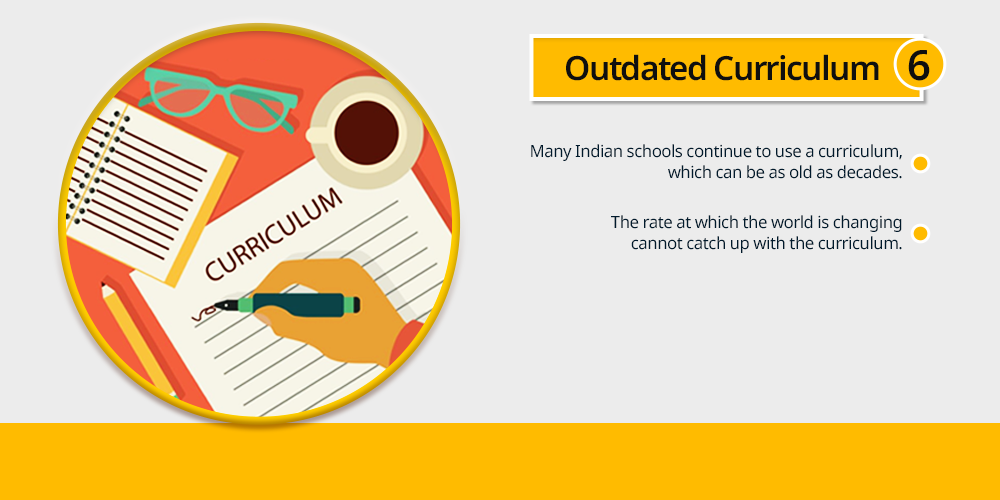
Many Indian schools are continuing to use a curriculum, which can be as old as decades and the rate at which the world is changing cannot catch up with the curriculum.
The above constructs such as entrepreneurship, computer programming, and information technology, are either not covered, or receive minimal attention and this means that the students are not prepared adequately for the job market.
Solution: The major concentration should not only be the ability of the host organization to enroll more students but also the quality of education being offered.
Schools should work to improve learning through Curriculum, practical experience, and problem-solving abilities.
7. Student-Teacher Ratio
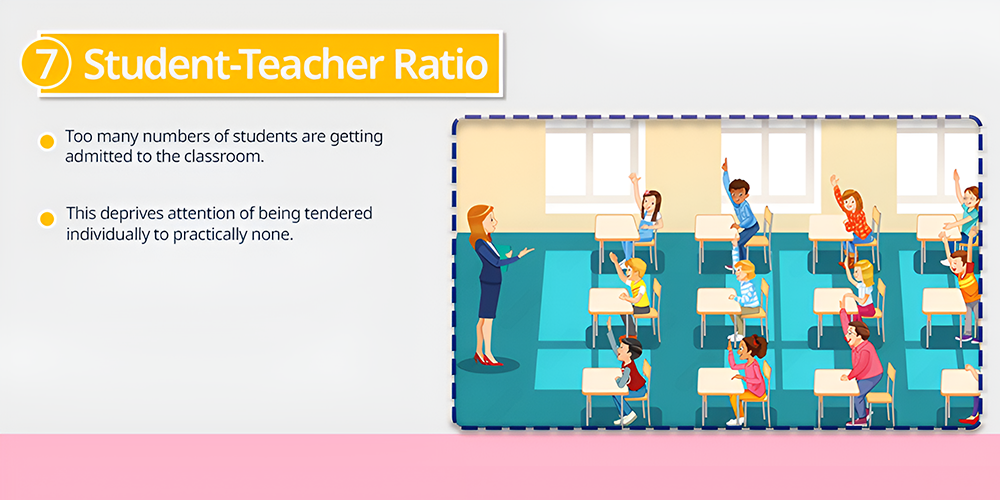
The idea of overcrowding in the classroom is very much familiar where too many numbers of students are getting admitted to the classroom in Indian schools only.
This deprives attention of being tendered individually to practically none, leading to grossly negative impacts on students as well as tremendously high dropout rates in various provinces.
Solution: The education department must focus on the mass recruitment drive of teachers to reduce the high student-teacher ratio. The public-private partnership can bridge this gap in the efficient student-teacher ratio.
8. Educational Inequality
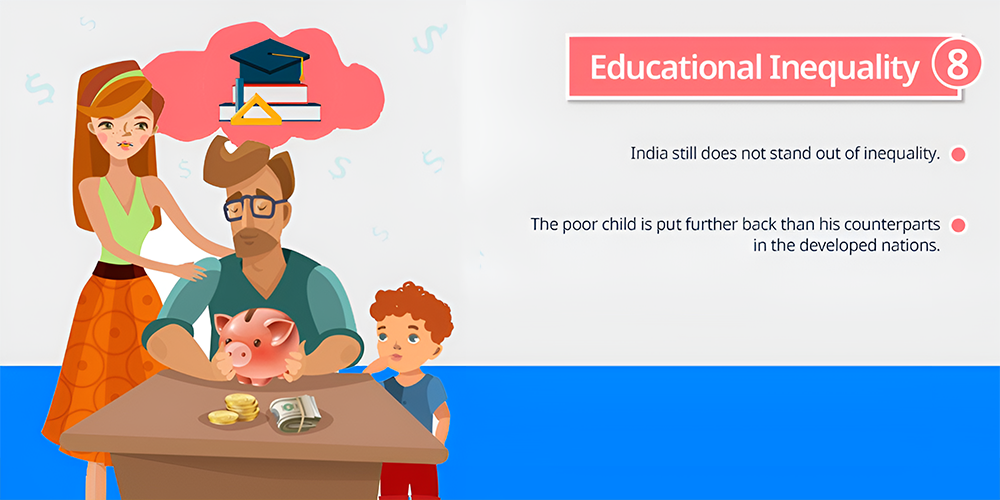
Internationally, India still does not stand out of inequality where a child from a rural poor or marginalized family produces less equivalent education than a child from an urban affluent family.
These restrictions furthermore sustain the divide in coverage for quality of space and elasticity socio-economic status. Thus the poor child is put further back than his counterparts in the developed nations.
Solution: It is necessary to feel the development and deployment of education promotion awareness campaigns that target parents and communities while they are in search of education.
Raise consciousness about the applicability of post-secondary education instruction; The latter is useful in low completion rates including but not limited to girl children.
In particular, it is higher education that should be made even more accessible to as many students as possible to introduce the desired change in one’s life with the help of education.
9. Lack of Infrastructure
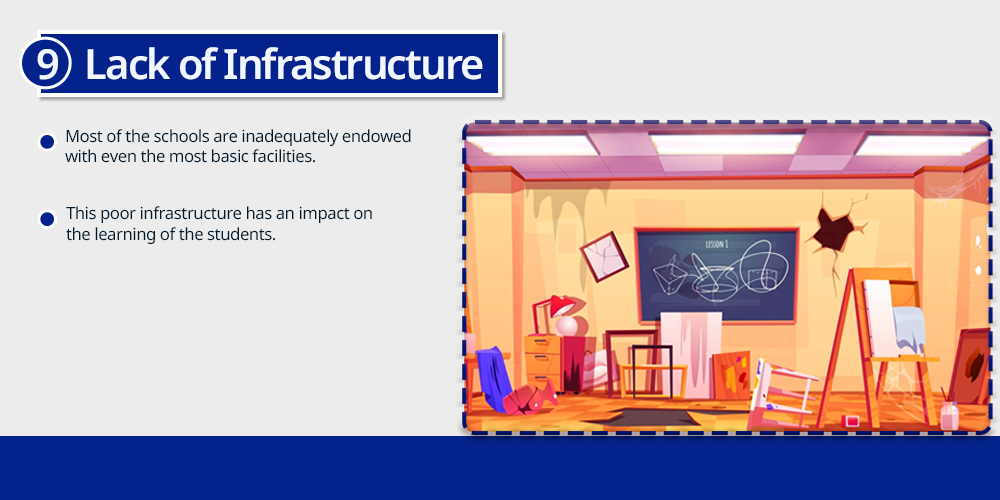
This is more so prevalent in areas where most of the schools are inadequately endowed with even the most basic facilities such as ideal classrooms, sufficient washrooms, libraries, and laboratories.
This poor infrastructure has an impact on the learning of the students and their development all around.
Solution: The improved and targeted funding along with the focus on private-public partnerships can address the infrastructural gaps in the Indian education system. The real-time monitoring and evaluation helps in ensuring transparency.
10. Neglect of Regional Languages
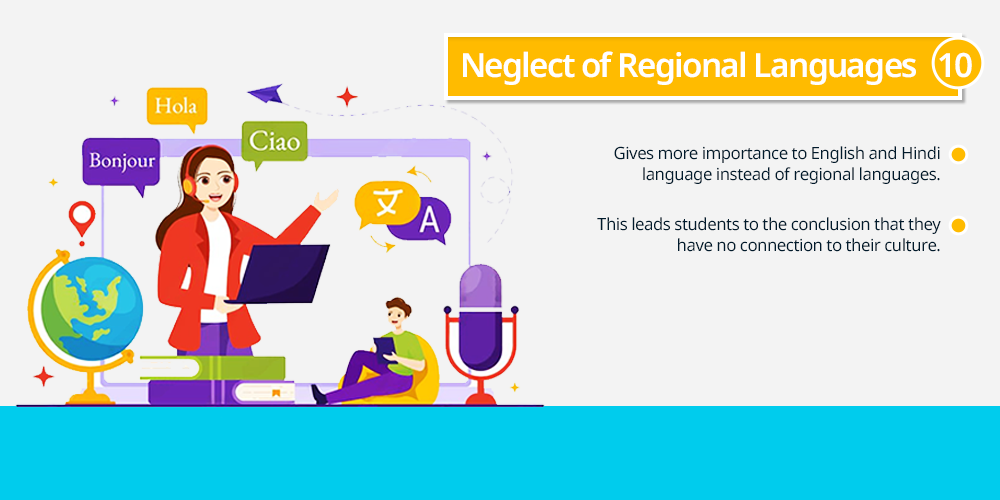
Firstly, India is a Nation that has diverse voices and spoken languages. However, the Indian education system gives more importance to English and Hindi language instead of regional languages.
Treatment of such a nature leads students to the conclusion that they have no connection to their culture and therefore their education is pointless.
Solution: What we do know is that a system that will meet all the intakes is more desirable. Such as being attentive to the regional languages; observing the principles of gender equality, i.e, inclusive education and giving education to the disabled learners
11. Theory-Based Education
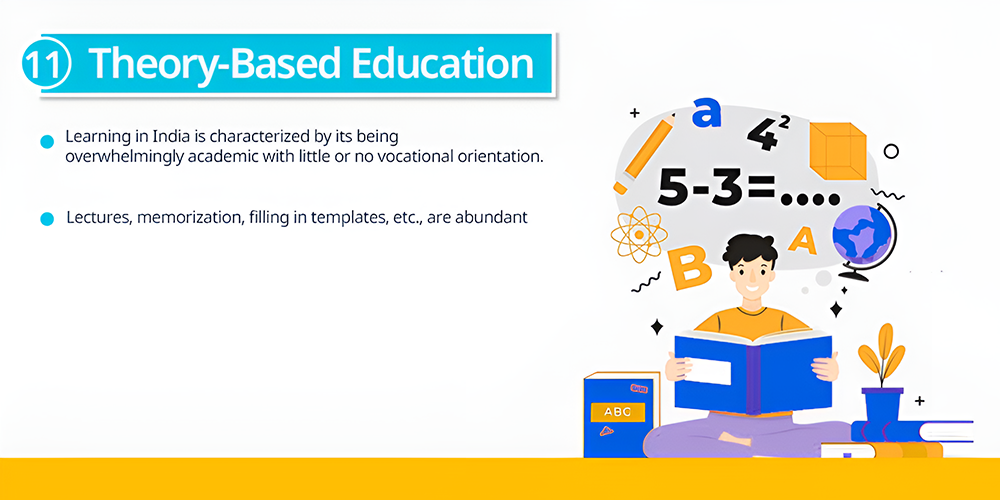
Learning in India is especially characterized by its being overwhelmingly academic with little or no vocational orientation.
Lectures, memorization, filling in templates, etc., are abundant while reasoning, problem-solving, evaluating and the opportunity to learn relationally to how they can apply the information they are learning to the outside world are limited.
Solution: The aim should be to make education more application-based and practical by aligning it with the NEP 2020 goals. The integration of the vocational and life skills further helps in achieving financial independence, problem-solving skills, along with academic growth.
12. Technology Integration
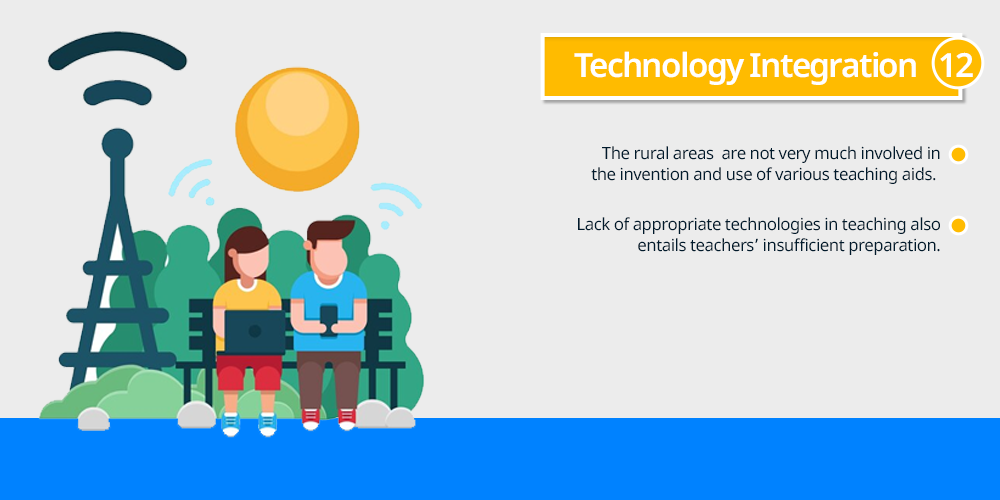
While international education is envisaging information technology application, there are many schools in India especially those in the rural areas which are not very much involved in the invention and use of various teaching aids.
Lack of appropriate technologies in teaching also entails teachers’ insufficient preparation also leads to this type of situation where students are not allowed to have a glimpse of the current forms of teaching-learning.
Solution: The digital classrooms, virtual labs, and e-learning could be beneficial to provide wider education in colleges; and schools in rural as well as urban zones.
Such as 21K School in India solely encompass all these digital as well as the traditional requirements needed in the education field and are among the key homeschooling solutions.
13. Problem of Brain Drain
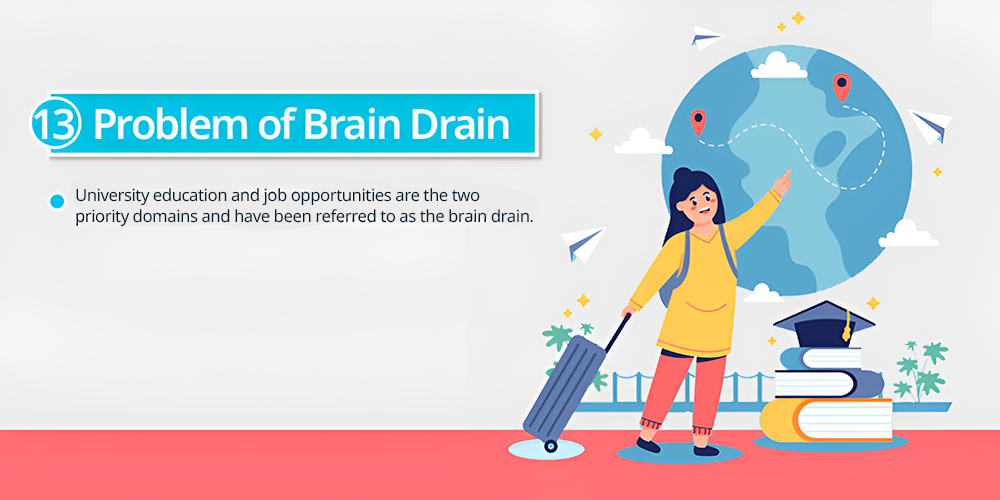
In the past decades, university education and job opportunities have been the two priority domains and have been referred to as the brain drain.
This is a result of the few research institutes and other institutions of higher learning apart from the fact that one can barely afford to pay competitive wages in India.
Solution: The issue of brain drain can be resolved with the strengthening of higher education and research organizations. The creation of better career and research opportunities helps in improving the quality of life and work in India itself.
14. Gross Enrolment Pattern
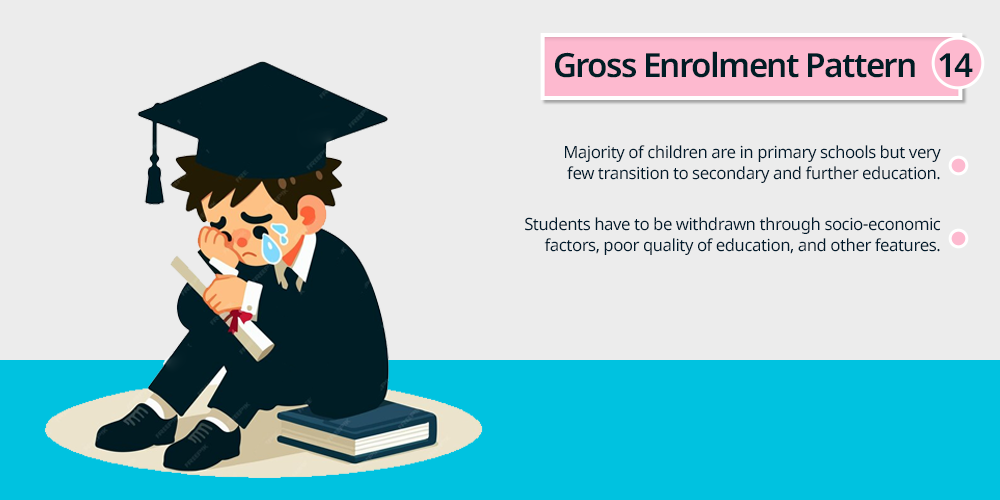
The Gross enrolments demonstrate that the majority of children are in primary schools but very few transition to secondary and further education.
Students have to be withdrawn through socio-economic factors, poor quality of education, and other features that have advanced possibilities in the advanced classes.
Solution: The problem with the gross enrolment pattern can be resolved by strengthening the school-to-college transition by offering career counseling and bridge programs. The access to higher education can be improved by leveraging technology for scaling up admissions.
15. Accreditation and Branding
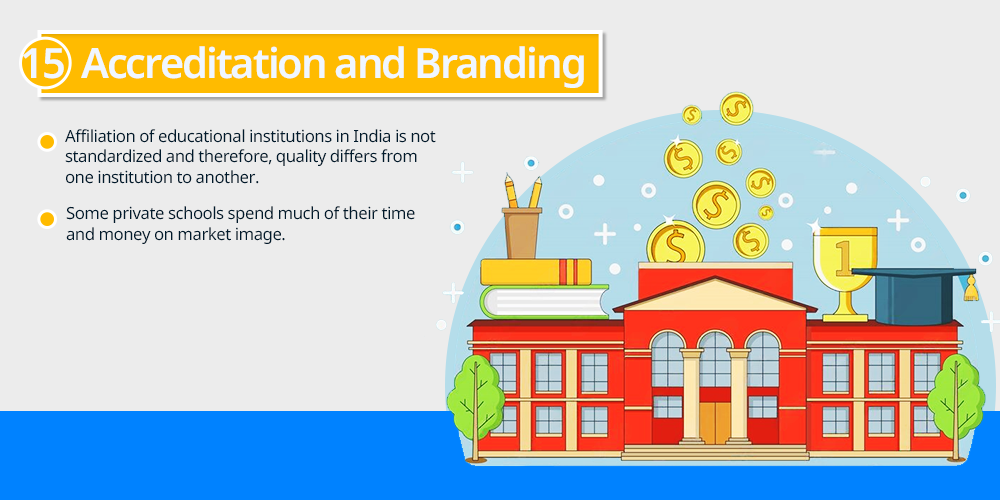
Affiliation of educational institutions in India is not standardized and therefore, quality differs from one institution to another.
Some private schools spend much of their time and money on market image and little or nothing on what they can offer any given student and this misleads unsuspecting students into enrolling in inferior programs.
Also read difference between Indian and British curriculum, and Indian vs American curriculum.
Solution: The educational systems should strictly follow the compulsory accreditation from trusted regulatory bodies like National Board of Accreditation (NBA) and National Assessment and Accreditation Council (NAAC). The availability of transparent ranking system helps in highlighting the regional achievers.
Summing Words
Despite all the flaws apparent in the Indian education system; however, it looks good and possesses the potential to build a pretty beautiful future for the country.
Therefore, one can conclude that thanks to changes in the curriculum, or to the application of technologies rather than expecting the delivery of more money for the growth of credits helps to raise the quality of learning and the learning process becomes more significant.
The goal justified should concentrate on more effective strategies assuring learner individual development, equity, and the least cost.
It’s a relief to learn that if the right policies, innovations and the necessary commitment from all the stakeholders the future of education in India could be enhanced.
